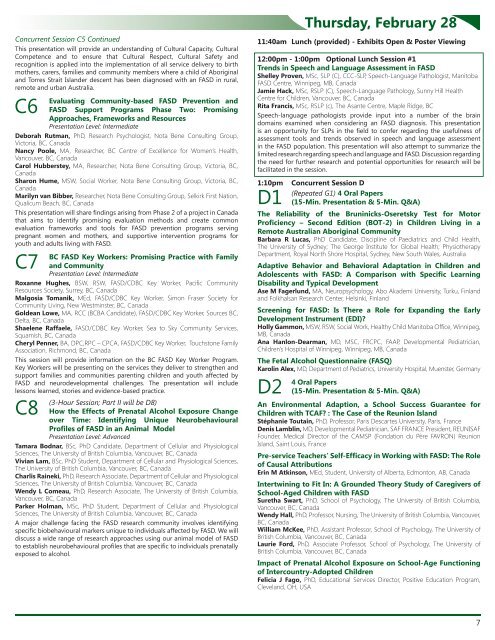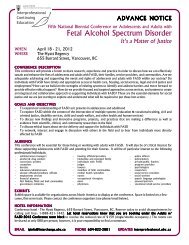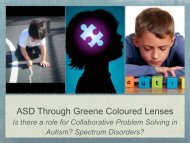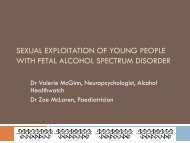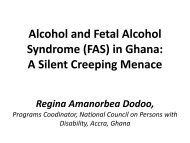Research, Results and Relevance: - Interprofessional.ubc.ca ...
Research, Results and Relevance: - Interprofessional.ubc.ca ...
Research, Results and Relevance: - Interprofessional.ubc.ca ...
Create successful ePaper yourself
Turn your PDF publications into a flip-book with our unique Google optimized e-Paper software.
Concurrent Session C5 Continued<br />
This presentation will provide an underst<strong>and</strong>ing of Cultural Capacity, Cultural<br />
Competence <strong>and</strong> to ensure that Cultural Respect, Cultural Safety <strong>and</strong><br />
recognition is applied into the implementation of all service delivery to birth<br />
mothers, <strong>ca</strong>rers, families <strong>and</strong> community members where a child of Aboriginal<br />
<strong>and</strong> Torres Strait Isl<strong>and</strong>er descent has been diagnosed with an FASD in rural,<br />
remote <strong>and</strong> urban Australia.<br />
C6<br />
Evaluating Community-based FASD Prevention <strong>and</strong><br />
FASD Support Programs Phase Two: Promising<br />
Approaches, Frameworks <strong>and</strong> Resources<br />
Presentation Level: Intermediate<br />
Deborah Rutman, PhD, <strong>Research</strong> Psychologist, Nota Bene Consulting Group,<br />
Victoria, BC, Canada<br />
Nancy Poole, MA, <strong>Research</strong>er, BC Centre of Excellence for Women’s Health,<br />
Vancouver, BC, Canada<br />
Carol Hubberstey, MA, <strong>Research</strong>er, Nota Bene Consulting Group, Victoria, BC,<br />
Canada<br />
Sharon Hume, MSW, Social Worker, Nota Bene Consulting Group, Victoria, BC,<br />
Canada<br />
Marilyn van Bibber, <strong>Research</strong>er, Nota Bene Consulting Group, Selkirk First Nation,<br />
Qualicum Beach, BC, Canada<br />
This presentation will share findings arising from Phase 2 of a project in Canada<br />
that aims to identify promising evaluation methods <strong>and</strong> create common<br />
evaluation frameworks <strong>and</strong> tools for FASD prevention programs serving<br />
pregnant women <strong>and</strong> mothers, <strong>and</strong> supportive intervention programs for<br />
youth <strong>and</strong> adults living with FASD.<br />
C7<br />
BC FASD Key Workers: Promising Practice with Family<br />
<strong>and</strong> Community<br />
Presentation Level: Intermediate<br />
Roxanne Hughes, BSW, RSW, FASD/CDBC Key Worker, Pacifi c Community<br />
Resources Society, Surrey, BC, Canada<br />
Malgosia Tomanik, MEd, FASD/CDBC Key Worker, Simon Fraser Society for<br />
Community Living, New Westminster, BC, Canada<br />
Goldean Lowe, MA, RCC (BCBA C<strong>and</strong>idate), FASD/CDBC Key Worker, Sources BC,<br />
Delta, BC, Canada<br />
Shaelene Raffaele, FASD/CDBC Key Worker, Sea to Sky Community Services,<br />
Squamish, BC, Canada<br />
Cheryl Penner, BA, DPC,RPC – CPCA, FASD/CDBC Key Worker, Touchstone Family<br />
Association, Richmond, BC, Canada<br />
This session will provide information on the BC FASD Key Worker Program.<br />
Key Workers will be presenting on the services they deliver to strengthen <strong>and</strong><br />
support families <strong>and</strong> communities parenting children <strong>and</strong> youth affected by<br />
FASD <strong>and</strong> neurodevelopmental challenges. The presentation will include<br />
lessons learned, stories <strong>and</strong> evidence-based practice.<br />
(3-Hour Session; Part II will be D8)<br />
C8 How the Effects of Prenatal Alcohol Exposure Change<br />
over Time: Identifying Unique Neurobehavioural<br />
Profiles of FASD in an Animal Model<br />
Presentation Level: Advanced<br />
Tamara Bodnar, BSc, PhD C<strong>and</strong>idate, Department of Cellular <strong>and</strong> Physiologi<strong>ca</strong>l<br />
Sciences, The University of British Columbia, Vancouver, BC, Canada<br />
Vivian Lam, BSc, PhD Student, Department of Cellular <strong>and</strong> Physiologi<strong>ca</strong>l Sciences,<br />
The University of British Columbia, Vancouver, BC, Canada<br />
Charlis Raineki, PhD, <strong>Research</strong> Associate, Department of Cellular <strong>and</strong> Physiologi<strong>ca</strong>l<br />
Sciences, The University of British Columbia, Vancouver, BC, Canada<br />
Wendy L Comeau, PhD, <strong>Research</strong> Associate, The University of British Columbia,<br />
Vancouver, BC, Canada<br />
Parker Holman, MSc, PhD Student, Department of Cellular <strong>and</strong> Physiologi<strong>ca</strong>l<br />
Sciences, The University of British Columbia, Vancouver, BC, Canada<br />
A major challenge facing the FASD research community involves identifying<br />
specific biobehavioural markers unique to individuals affected by FASD. We will<br />
discuss a wide range of research approaches using our animal model of FASD<br />
to establish neurobehavioural profiles that are specific to individuals prenatally<br />
exposed to alcohol.<br />
11:40am Lunch (provided) - Exhibits Open & Poster Viewing<br />
12:00pm - 1:00pm Optional Lunch Session #1<br />
Trends in Speech <strong>and</strong> Language Assessment in FASD<br />
Shelley Proven, MSc, SLP (C), CCC-SLP, Speech-Language Pathologist, Manitoba<br />
FASD Centre, Winnipeg, MB, Canada<br />
Jamie Hack, MSc, RSLP (C), Speech-Language Pathology, Sunny Hill Health<br />
Centre for Children, Vancouver, BC, Canada<br />
Rita Francis, MSc, RSLP (c), The Asante Centre, Maple Ridge, BC<br />
Speech-language pathologists provide input into a number of the brain<br />
domains examined when considering an FASD diagnosis. This presentation<br />
is an opportunity for SLPs in the field to confer regarding the usefulness of<br />
assessment tools <strong>and</strong> trends observed in speech <strong>and</strong> language assessment<br />
in the FASD population. This presentation will also attempt to summarize the<br />
limited research regarding speech <strong>and</strong> language <strong>and</strong> FASD. Discussion regarding<br />
the need for further research <strong>and</strong> potential opportunities for research will be<br />
facilitated in the session.<br />
1:10pm Concurrent Session D<br />
(Repeated G1) 4 Oral Papers<br />
D1 (15-Min. Presentation & 5-Min. Q&A)<br />
The Reliability of the Bruninicks-Oseretsky Test for Motor<br />
Proficiency – Second Edition (BOT-2) in Children Living in a<br />
Remote Australian Aboriginal Community<br />
Barbara R Lu<strong>ca</strong>s, PhD C<strong>and</strong>idate, Discipline of Paediatrics <strong>and</strong> Child Health,<br />
The University of Sydney; The George Institute for Global Health; Physiotherapy<br />
Department, Royal North Shore Hospital, Sydney, New South Wales, Australia<br />
Adaptive Behavior <strong>and</strong> Behavioral Adaptation in Children <strong>and</strong><br />
Adolescents with FASD: A Comparison with Specific Learning<br />
Disability <strong>and</strong> Typi<strong>ca</strong>l Development<br />
Ase M Fagerlund, MA, Neuropsychology, Abo Akademi University, Turku, Finl<strong>and</strong><br />
<strong>and</strong> Folkhalsan <strong>Research</strong> Center, Helsinki, Finl<strong>and</strong><br />
Screening for FASD: Is There a Role for Exp<strong>and</strong>ing the Early<br />
Development Instrument (EDI)?<br />
Holly Gammon, MSW, RSW, Social Work, Healthy Child Manitoba Offi ce, Winnipeg,<br />
MB, Canada<br />
Ana Hanlon-Dearman, MD, MSC, FRCPC, FAAP, Developmental Pediatrician,<br />
Children’s Hospital of Winnipeg, Winnipeg, MB, Canada<br />
The Fetal Alcohol Questionnaire (FASQ)<br />
Karolin Alex, MD, Department of Pediatrics, University Hospital, Muenster, Germany<br />
D2<br />
Thursday, February 28<br />
4 Oral Papers<br />
(15-Min. Presentation & 5-Min. Q&A)<br />
An Environmental Adaption, a School Success Guarantee for<br />
Children with TCAF? : The Case of the Reunion Isl<strong>and</strong><br />
Stéphanie Toutain, PhD, Professor, Paris Des<strong>ca</strong>rtes University, Paris, France<br />
Denis Lamblin, MD, Developmental Pediatrician, SAF FRANCE President, REUNISAF<br />
Founder, Medi<strong>ca</strong>l Director of the CAMSP (Fondation du Père FAVRON) Reunion<br />
Isl<strong>and</strong>, Saint Louis, France<br />
Pre-service Teachers’ Self-Effi<strong>ca</strong>cy in Working with FASD: The Role<br />
of Causal Attributions<br />
Erin M Atkinson, MEd, Student, University of Alberta, Edmonton, AB, Canada<br />
Intertwining to Fit In: A Grounded Theory Study of Caregivers of<br />
School-Aged Children with FASD<br />
Suretha Swart, PhD, School of Psychology, The University of British Columbia,<br />
Vancouver, BC, Canada<br />
Wendy Hall, PhD, Professor, Nursing, The University of British Columbia, Vancouver,<br />
BC, Canada<br />
William McKee, PhD, Assistant Professor, School of Psychology, The University of<br />
British Columbia, Vancouver, BC, Canada<br />
Laurie Ford, PhD, Associate Professor, School of Psychology, The University of<br />
British Columbia, Vancouver, BC, Canada<br />
Impact of Prenatal Alcohol Exposure on School-Age Functioning<br />
of Intercountry-Adopted Children<br />
Felicia J Fago, PhD, Edu<strong>ca</strong>tional Services Director, Positive Edu<strong>ca</strong>tion Program,<br />
Clevel<strong>and</strong>, OH, USA<br />
7


